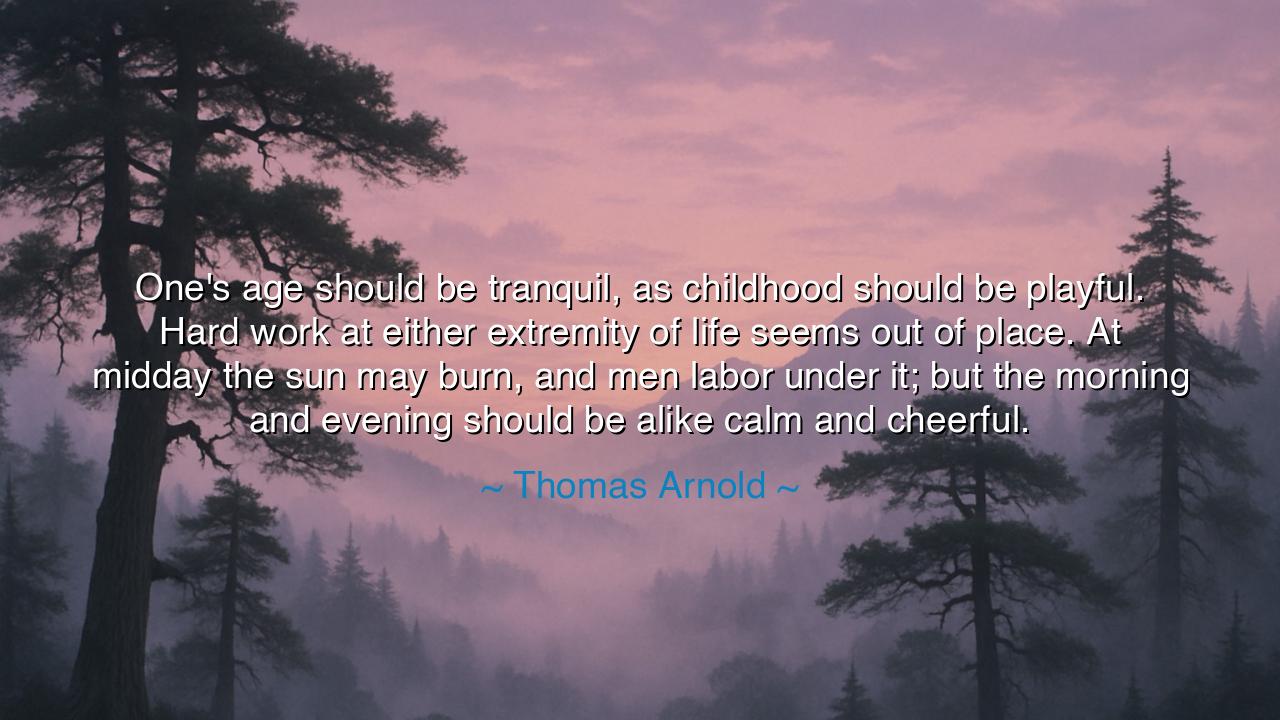
One's age should be tranquil, as childhood should be playful.
One's age should be tranquil, as childhood should be playful. Hard work at either extremity of life seems out of place. At midday the sun may burn, and men labor under it; but the morning and evening should be alike calm and cheerful.






In the grand journey of life, there are times of great exertion and times of restful calm. Thomas Arnold, in his profound reflection, reminds us that "One's age should be tranquil, as childhood should be playful. Hard work at either extremity of life seems out of place. At midday the sun may burn, and men labor under it; but the morning and evening should be alike calm and cheerful." These words speak to the natural rhythms of life, a wisdom passed down through the ages, which tells us that every stage of life has its purpose and its pace, and that balance is the key to living well.
In the ancient world, youth was often seen as a time of growth and joy, a time to play, to explore, and to build the foundation for one's future. The great philosopher Aristotle spoke of virtue as something that should be practiced in a balanced way. In youth, virtue was nurtured through playfulness, the freedom to learn without the burdens of responsibility weighing one down. The early years were for building, for learning through experience, and for developing the character that would later be tested in the more demanding parts of life. Just as childhood should be playful, adulthood should find its strength in hard work, but not at the expense of balance.
Arnold's wisdom teaches us that this balance must shift as we age. The tranquility of one's later years should not be burdened by the incessant striving of youth, nor should the carefree play of childhood turn into a pursuit of wealth or power. There is a natural progression in life that reflects the rhythms of the sun itself. Midday, the height of activity, demands hard work and intensity, for it is the time when the world is brightest and the demands of the world call to us. But in the morning and evening, when the day winds down, there is a need for calm and for reflection, a time to gather the wisdom of the hours and savor the richness of life without the rush.
Consider the life of the great Confucius, who, in his later years, shifted from a life of political ambition and active leadership to one of teaching and reflection. In his youth, he sought to bring about reform, to labor for the good of the state, tirelessly working to change the systems of his time. But as he grew older, he embraced the wisdom of Arnold's words—his later years became a time of tranquility, where he passed down his teachings, reflecting on life’s deeper truths. Confucius understood that, in the twilight of life, one must not struggle, but instead sit quietly, sharing wisdom, offering guidance, and enjoying the peace earned through years of labor.
Arnold's reflection on hard work at the extremes of life is not a call to abandon purpose, but rather to place purpose in its proper time. As we enter our golden years, we are called not to strive relentlessly, but to reflect on the work we have done, to savor the fruits of labor, and to offer our experience to those who follow. Hard work is important, but only when it is balanced by moments of peace and contentment. At midday, we must labor, but as the sun sets, we must allow ourselves the grace of rest, the calm of a life well-lived, and the quiet enjoyment of the simple moments that remain.
The morning and evening, when life is at a gentler pace, are times to reflect, to nurture the mind and soul, and to experience joy without the pressures of the midday sun. Just as the body requires periods of rest and rejuvenation to maintain strength, so too does the spirit need tranquility in order to remain sharp and engaged with the world. Socrates, in his later years, chose to spend his time not in the heat of political struggle, but in conversations, teaching the next generation, seeking peace in the exchange of ideas. His life, as it aged, became a testament to the power of reflection, to the wisdom that comes when we step back from the rush and allow ourselves to rest in contentment.
Thus, the lesson of Thomas Arnold's quote is clear: life must be lived in balance. In youth, there is a time for play and for learning, while in age, there is a time for tranquility and reflection. It is not the extremes of hard labor at both ends of life that bring fulfillment, but rather the balance between striving and resting, between work and reflection. Just as the sun burns at midday, but softens in the morning and evening, so too must our lives follow the rhythm of the day—striving when necessary, but always returning to moments of peace and joy.
In our own lives, let us embrace this wisdom. Let us not burn ourselves out in the heat of ambition, nor let us abandon purpose in our later years, but instead seek to live in harmony with the natural rhythms of life. Let our work be balanced with moments of peace, and let the later years of life be marked not by struggle, but by the serenity and joy that comes with time well spent.






AAdministratorAdministrator
Welcome, honored guests. Please leave a comment, we will respond soon